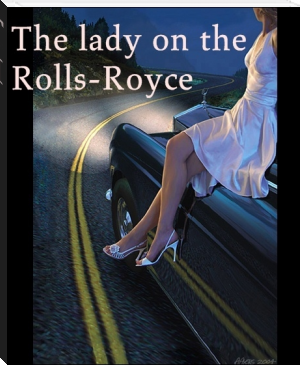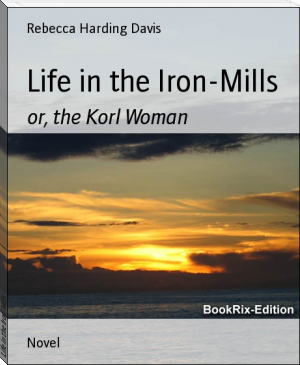Life in the Iron-Mills by Rebecca Harding Davis (best novels ever .TXT) 📕

She lay quiet in the dark corner, listening, through the monotonous din and uncertain glare of the works, to the dull plash of the rain in the far distance, shrinking back whenever the man Wolfe happened to look towards her. She knew, in spite of all his kindness, that there was that in her face and form which made him loathe the sight of her. She felt by instinct, although she could not comprehend it, the finer nature of the man, which made him among his fellow-workmen something unique, set apart. She knew, that, down und
Read free book «Life in the Iron-Mills by Rebecca Harding Davis (best novels ever .TXT) 📕» - read online or download for free at americanlibrarybooks.com
- Author: Rebecca Harding Davis
- Performer: -
Read book online «Life in the Iron-Mills by Rebecca Harding Davis (best novels ever .TXT) 📕». Author - Rebecca Harding Davis
Deborah did not doubt her. As the evening wore on, she leaned against the iron bars, looking at the hills that rose far off, through the thick sodden clouds, like a bright, unattainable calm. As she looked, a shadow of their solemn repose fell on her face; its fierce discontent faded into a pitiful, humble quiet. Slow, solemn tears gathered in her eyes: the poor weak eyes turned so hopelessly to the place where Hugh was to rest, the grave heights looking higher and brighter and more solemn than ever before. The Quaker watched her keenly. She came to her at last, and touched her arm.
“When thee comes back,” she said, in a low, sorrowful tone, like one who speaks from a strong heart deeply moved with remorse or pity, “thee shall begin thy life again,—there on the hills. I came too late; but not for thee,—by God’s help, it may be.”
Not too late. Three years after, the Quaker began her work. I end my story here. At evening-time it was light. There is no need to tire you with the long years of sunshine, and fresh air, and slow, patient Christ-love, needed to make healthy and hopeful this impure body and soul. There is a homely pine house, on one of these hills, whose windows overlook broad, wooded slopes and clover-crimsoned meadows,—niched into the very place where the light is warmest, the air freest. It is the Friends’ meeting-house. Once a week they sit there, in their grave, earnest way, waiting for the Spirit of Love to speak, opening their simple hearts to receive His words. There is a woman, old, deformed, who takes a humble place among them: waiting like them: in her gray dress, her worn face, pure and meek, turned now and then to the sky. A woman much loved by these silent, resfful people; more silent than they, more humble, more loving. Waiting: with her eyes turned to hills higher and purer than these on which she lives,dim and far off now, but to be reached some day. There may be in her heart some latent hope to meet there the love denied her here,—that she shall find him whom she lost, and that then she will not be all-unworthy. Who blames her? Something is lost in the passage of every soul from one eternity to the other,—something pure and beautiful, which might have been and was not: a hope, a talent, a love, over which the soul mourns, like Esau deprived of his birthright. What blame to the meek Quaker, if she took her lost hope to make the hills of heaven more fair?
Nothing remains to tell that the poor Welsh puddler once lived, but this figure of the mill-woman cut in korl. I have it here in a corner of my library. I keep it hid behind a curtain,—it is such a rough, ungainly thing. Yet there are about it touches, grand sweeps of outline, that show a master’s hand. Sometimes,—to-night, for instance,—the curtain is accidentally drawn back, and I see a bare arm stretched out imploringly in the darkness, and an eager, wolfish face watching mine: a wan, woful face, through which the spirit of the dead korl-cutter looks out, with its thwarted life, its mighty hunger, its unfinished work. Its pale, vague lips seem to tremble with a terrible question. “Is this the End?” they say,—“nothing beyond? no more?” Why, you tell me you have seen that look in the eyes of dumb brutes,—horses dying under the lash. I know.
The deep of the night is passing while I write. The gas-light wakens from the shadows here and there the objects which lie scattered through the room: only faintly, though; for they belong to the open sunlight. As I glance at them, they each recall some task or pleasure of the coming day. A half-moulded child’s head; Aphrodite; a bough of forest-leaves; music; work; homely fragments, in which lie the secrets of all eternal truth and beauty. Prophetic all! Only this dumb, woful face seems to belong to and end with the night. I turn to look at it. Has the power of its desperate need commanded the darkness away? While the room is yet steeped in heavy shadow, a cool, gray light suddenly touches its head like a blessing hand, and its groping arm points through the broken cloud to the far East, where, in the flickering, nebulous crimson, God has set the promise of the Dawn.





Comments (0)